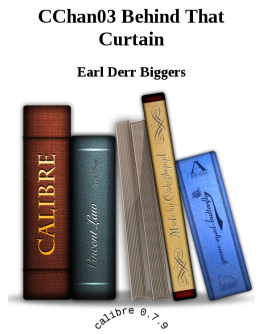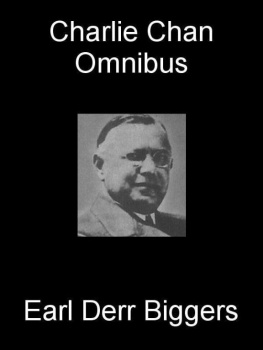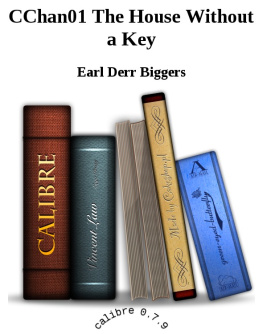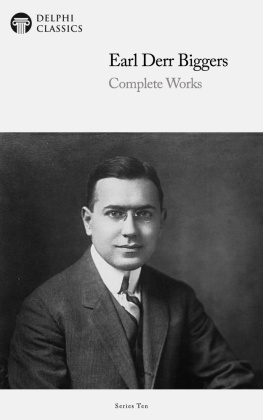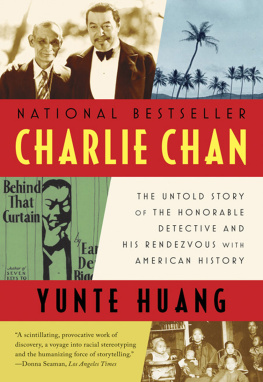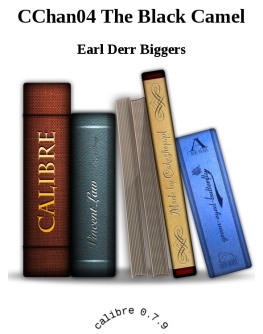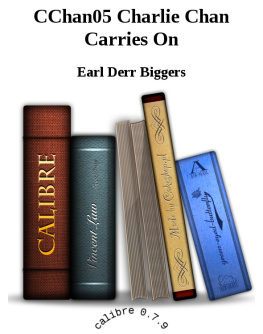Earl Derr Biggers - Behind That Curtain (Charlie Chan 3)
Here you can read online Earl Derr Biggers - Behind That Curtain (Charlie Chan 3) full text of the book (entire story) in english for free. Download pdf and epub, get meaning, cover and reviews about this ebook. year: 1928, genre: Detective and thriller. Description of the work, (preface) as well as reviews are available. Best literature library LitArk.com created for fans of good reading and offers a wide selection of genres:
Romance novel
Science fiction
Adventure
Detective
Science
History
Home and family
Prose
Art
Politics
Computer
Non-fiction
Religion
Business
Children
Humor
Choose a favorite category and find really read worthwhile books. Enjoy immersion in the world of imagination, feel the emotions of the characters or learn something new for yourself, make an fascinating discovery.
- Book:Behind That Curtain (Charlie Chan 3)
- Author:
- Genre:
- Year:1928
- Rating:5 / 5
- Favourites:Add to favourites
- Your mark:
- 100
- 1
- 2
- 3
- 4
- 5
Behind That Curtain (Charlie Chan 3): summary, description and annotation
We offer to read an annotation, description, summary or preface (depends on what the author of the book "Behind That Curtain (Charlie Chan 3)" wrote himself). If you haven't found the necessary information about the book — write in the comments, we will try to find it.
Behind That Curtain (Charlie Chan 3) — read online for free the complete book (whole text) full work
Below is the text of the book, divided by pages. System saving the place of the last page read, allows you to conveniently read the book "Behind That Curtain (Charlie Chan 3)" online for free, without having to search again every time where you left off. Put a bookmark, and you can go to the page where you finished reading at any time.
Font size:
Interval:
Bookmark:
BEHIND THAT CURTAIN
Earl Derr Biggers
First published in 1928
CHAPTER I
The Man from Scotland Yard
BILL RANKIN sat motionless before his typewriter, grimly seeking a lead for the interview he was about to write. A black shadow shot past his elbow and materialized with a soft thud on his desk. Bill's heart leaped into his throat and choked him.
But it was only Egbert, the office cat. Pretty lonesome round here, seemed to be Egbert's idea. How about a bit of play? Rankin glared at the cat with deep disgust. Absurd to be so upset by a mere Egbert, but when one has been talking with a great man for over an hour and the subject of the talk has been murder, one is apt to be a trifle jumpy.
He reached out and pushed Egbert to the floor. "Go away," he said. "What do you mean, scaring me out of a year's growth? Can't you see I'm busy?"
His dignity offended, Egbert stalked off through the desert of typewriter tables and empty chairs. Bill Rankin watched him disappear at last through the door leading into the hallway. The hour was five thirty; the street ten stories below was filled with homegoing throngs, but up here in the city room of the Globe a momentary quiet reigned. Alone of all the green-shaded lamps in the room, the one above Rankin's typewriter was alight, shedding a ghastly radiance on the blank sheet of paper in his machine. Even the copy desk was deserted. In his cubby-hole at the rear sat the Globe's city editor, the only other human thing in sight. And he was not, if you believed the young men who worked for him, so very human at that.
Bill Rankin turned back to his interview. For a brief moment he sat wrapped in thought; then his long, capable fingers sought the keys. He wrote:
"The flights of genius and miracles of science which solve most of the crimes in detective stories have no real part in detective work. This is the verdict of Sir Frederic Bruce, former head of the Criminal Investigation Department at Scotland Yard.
"Sir Frederic, who is stopping over for two weeks in San Francisco during the course of a trip around the world, is qualified to give an expert opinion. For nearly seventeen years he acted as Deputy-Commissioner at the head of the most famous detective organization in existence, and though he has now retired, his interest in crime detection is as keen as ever. Sir Frederic is a big man, with a kindly twinkle in his gray eyes, but occasionally those eyes have a steely look that made this reporter nervous. If we had killed the old Earl of Featherstonehaugh on his rare Persian rug, we would not care to have Sir Frederic on our trail. For the great detective is that type of Scotchman who is a stranger to defeat. He would never abandon the scent.
"'I read a great deal of detective fiction,' Sir Frederic said. 'It amuses me, but there is usually nothing for a detective to learn from it. Except for the fingerprint system and work in the chemical laboratory on stains, scientific research has furnished little assistance to crime detection. Murder mysteries and other difficult criminal cases are solved by intelligence, hard work and luck, with little help from the delicate scientific devices so dear to the authors of--'"
Suddenly Bill Rankin stopped writing and sat erect in his uncomfortable chair. There was a familiar ring to the ideas he was setting down on paper; he had heard them before, and recently. Opinions identical with these, expressed not in the polished English of Sir Frederic, but in a quite different idiom---Ah yes. He smiled, recalling that pudgy little man he had interviewed three days ago in the lobby of the Stewart Hotel.
The reporter rose from his chair and, lighting a cigarette, began to pace the floor. He spoke aloud: "Of course---and I never thought of it. A corking feature story staring me right in the face, and I was blind-- blind. I must be losing my grip." He looked anxiously at the clock, tossed aside his cigarette and resumed his chair. Completing the sentence which he had interrupted midway, he continued:
"Sir Frederic was asked what he considered the greatest piece of detective work within his knowledge.
"'I can not answer that because of the important part played by chance,' he replied. 'As I have just said, most criminal cases are solved by varying proportions of hard work, intelligence and luck, and I am sorry I must add that of these three, luck is the greatest by far.
"'Hard, methodical work, however, has brought results in many instances. For example, it unraveled the famous Crippen mystery. The first intimation we had of something wrong in that case came when we heard that the woman treasurer of a music-hall--'"
Bill Rankin wrote on, with lightning speed now, for he was eager to finish. The thing he was doing had suddenly become a minor matter. A far better story was running through his head. His fingers flew over the keys; when he paused, at rare intervals, it was to turn an inquiring gaze on the clock.
He ripped the final sheet of paper from his machine, snatched up the story, and hurried toward the city editor's nook. The lone man in charge of the Copy desk, just returned from a bitter argument with the composing-room foreman, watched him sourly as he passed, and grimly sharpened a blue pencil.
"Wha's 'at?" inquired the city editor, as Bill Rankin threw the story down before him.
"Interview with Sir Frederic Bruce," Bill reminded him.
"Oh, you found him, did you?"
"We all found him. The room was full of reporters."
"Where was he?"
"He's putting up at Barry Kirk's bungalow. Kirk knew his son in London. I tried the hotels until my feet ached."
The editor snorted. "The more fool you. No Englishman ever stops at a hotel if he can wangle board and room from somebody. You've been sent out to find enough lecturing British authors to know that."
"The interview's blah," said Rankin. "Every paper in town will have it. But while I was writing it, an idea for a feature hit me hard. It'll be a humdinger---if I can only put it over on Sir Frederic. I thought I'd go back up there and see what I can do."
"A feature?" The editor frowned. "If you happen on a bit of news in the course of your literary work, you'll let me know, won't you? Here I am, trying to get out a newspaper, and all I get from you fellows is an avalanche of pretty little essays. I suspect you're all hoping that some day you'll be tapped for the Atlantic Monthly."
"But this feature's good," Rankin protested. "I must hurry along--"
"Just a minute. I'm only your editor, of course. I don't want to pry into your plans--"
Rankin laughed. He was an able man, and privileged. "I'm sorry, sir, but I can't stop to explain now. Some one may beat me to it yet. Gleason of the Herald was up there to-day and he'll get the same hunch as sure as fate. So if you don't mind--"
The editor shrugged. "All right---go to it. Hurry up to the Kirk Building. And don't let this sudden attack of energy die there. Hurry back, too."
"Yes, sir," agreed the reporter. "Of course, I'll need a bit of dinner--"
"I never eat," growled his charming employer.
Bill Rankin sped across the city room. His fellow reporters were drifting in now from their afternoon assignments, and the place was coming to life. Near the door, Egbert, black as the night from pole to pole, crossed Rankin's path with haughty, aloof manner and dignified stride.
Descending to the street, the reporter stood for a moment undecided. The Kirk Building was not far away; he could walk there---but time was precious. Suppose he arrived to be met by the news that Sir Frederic was dressing for dinner. With this famous and correct Englishman, the act would be a sacred rite not to be lightly interrupted by panting pressmen. No, he must reach Sir Frederic before the detective reached for his black pearl studs. He hailed a passing taxi.
Next pageFont size:
Interval:
Bookmark:
Similar books «Behind That Curtain (Charlie Chan 3)»
Look at similar books to Behind That Curtain (Charlie Chan 3). We have selected literature similar in name and meaning in the hope of providing readers with more options to find new, interesting, not yet read works.
Discussion, reviews of the book Behind That Curtain (Charlie Chan 3) and just readers' own opinions. Leave your comments, write what you think about the work, its meaning or the main characters. Specify what exactly you liked and what you didn't like, and why you think so.

